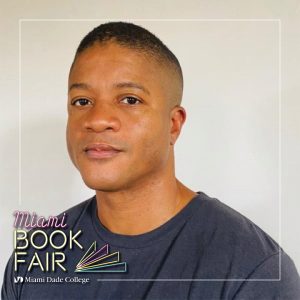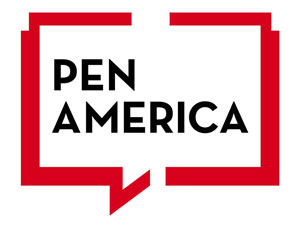
William Johnson is the director of PEN Across America, an initiative that provides resources to PEN America communities nationwide so they can carry forward the organization’s mission of defending and celebrating free expression. PEN Across America is a sponsor of the Miami Book Fair-produced Little Haiti Book Festival, which takes place annually in May.

Tell me a little about PEN America.
We’re a human rights organization that champions the freedom to write and recognizes the power of the written word to transform the world. PEN America works very hard to cultivate literary engagement while also making sure there are avenues and venues for literature and ideas to be freely shared.
What does that look like through the lens of your day to day?
I work with stakeholders across the country to further that mission and align myself with stakeholders who are particularly dedicated to both literary engagement and free expression. We form chapter cities or regions with those stakeholders, and Miami is one of them. The work Miami Book Fair does really aligns with our mission, and it’s a partnership that makes sense. PEN America uses the institutional support and knowledge we have to elevate programming that already exists with our stakeholders, or we work with them to create programming that reflects our respective missions.
And that’s what drew PEN to Book Fair.
Yeah, and it’s what drew me to Book Fair personally before I was even at PEN. The work I witnessed that was happening with Book Fair was really changing ideas around what’s considered the master narrative. There were these voices that traditionally hadn’t been elevated in certain literary ecosystems or communities that were being elevated at Book Fair. Voices from the immigrant community, people of color – and not just in a way that was based around identity, but also around how those communities create a particular aesthetic, and that was really interesting to me. Things about craft, how identity shapes your craft, and how that can be a golden thread of how we can envision an expansive literary community.
I remember a panel with Marlon James, and that was actually the first time I had heard of him, at this Book Fair panel –
Really?
Yeah, and this was years ago, but that kind of showing me a new literary voice of the time was amazing and inspiring. That really tracks with the work I’m trying to do with national engagement. I remember meeting Danez Smith for the first time at Book Fair, too. Miami Book Fair is a real connector; it introduces me to new literature and new writers. It’s a community. It’s in vogue now to, you know, “elevate disenfranchised communities,” but Miami Book Fair has been doing that since the jump.
Let’s shift focus. I want to know what’s on your nightstand.
Walking Through Clear Water in a Pool Painted Black, which I’m loving; it’s the collected stories of Cookie Mueller. She was a downtown New York, late seventies, early eighties – New York and Boston and I think P-town – kind of art star who was in John Waters films, kind of like a scenester, but she also was fantastic writer. They collected all of her work and it is great. She lived a chaotic life but she wrote about it with such grace and humor. It’s very raw, from heroin to hitchhiking across the country to dealing with a friend’s suicide. It is really, really good. I’m also digging back into the archives and reading some stuff I missed.
Like what?
OK, this is something that was recently released, but it is archival. There was a queer, kind of punk rock artist/scenester named Sean DeLear, and he was really big in what they called the Silver Lake post-punk scene in LA. He died in 2017 and they found his diaries from 1979 when he was 15, and it’s bananas. It’s him coming to terms with his sexuality and it captures his lust for life and what it was like to be a Black, queer kid in suburban California in 1979. It’s called I Could Not Believe It. I want everyone to be as shameless and as comfortable around their identity as he was. And I’m looking forward to reading Brandon Taylor’s new novel, The Late Americans.
There’s a lot of churn going on right now on the literary landscape, including book banning. Can you share your thoughts on that?
We have a very specific kind of definition of what book bans are, and we always talk about them in the context of school libraries, you know, basically books that were accessible, curated by librarians – because we trust librarians, we trust educators to guide their curriculum – that are being taken off the shelves, without due diligence. And Florida and Texas are neck and neck on that. And guess what those books are? Thirty percent have characters of color, 26% have LGBTQ+ characters, so it’s these books that folks have long fought to see on the shelves, to see themselves, and communities that Miami Book Fair has continually elevated in its programming are now under threat. It’s kind of like all the work that so many fine organizations – like Miami Book Fair, like school librarians – have done to create a more expansive community of readers and so people can learn something beyond themselves, are being extinguished. It’s frightening and it’s now state mandated. It’s heartbreaking.
What is PEN doing to help people navigate all the changes?
We’re trying to get community stakeholders involved in the pushback. That means getting them informed around their local school boards, learning about all the different house bills that are going through, how to advocate for yourself both at the school board level and the state level, and just doing awareness campaigns around the scope and vastness of these bans. So there’s an education component to this and there’s an activation component. We’re providing the data and then using this data to activate folks and then to strategize – through convenings, through connecting stakeholders, through becoming like an organizing principal around pushing back. That’s PEN America’s role right now, and it will change and become more expansive as the work continues.
If someone were to write your biography, what would its title be?
Tender. My father taught me two things: Be curious and be tender, and those have been my guiding principles.
Interview by Elisa Chemayne Agostinho; responses have been edited for space and clarity.